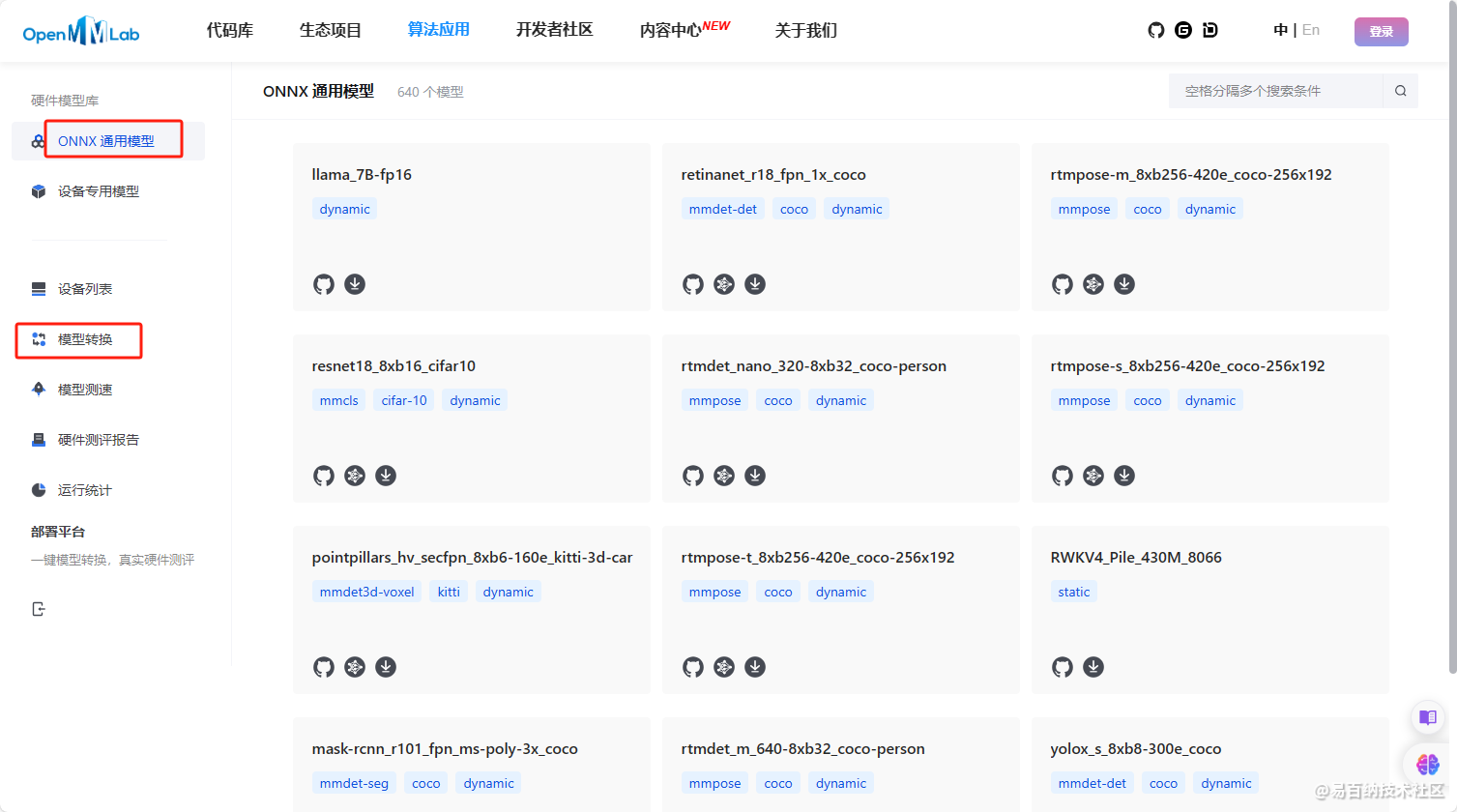技术专栏
基于mmpose的动作分类
基于mmpose的动作分类
说明:本项目使用了检测+关键点+跟踪+分类
检测模型
本项目使用yolov7的模型进行人体的检测
克隆项目
git clone https://github.com/WongKinYiu/yolov7.git
下载模型:
https://github.com/WongKinYiu/yolov7/releases/download/v0.1/yolov7.pt
在文件路径输入cmd进入终端然后创建环境,安装依赖
conda create -n 环境名 python=X.X
pip install -r requirements.txt -i https://pypi.tuna.tsinghua.edu.cn/simple
该命令可以下载快一点,使用的国内源
测试环境,如果有检测结果,说明环境安装完成
python detect.py --weights weights/yolov7.pt --source inference/images
封装
创建新的项目PoseAndSort
将v7的utils和models文件夹复制到新的项目,然后新建一个pose.py,对检测模型进行封装
class MyDetect:
def __init__(self, weights, device_name, img_size=640):
# print('detectapi __init__')
self.opt = simulation_opt(weights=weights, img_size=img_size)
weights, imgsz = self.opt.weights, self.opt.img_size
# Initialize
set_logging()
if device_name != "cuda":
self.device = select_device("0")
else:
self.device = select_device(device_name)
self.half = self.device.type != 'cpu' # half precision only supported on CUDA
# model = torch.load(weights,
# map_location=self.device) # load FP32 model
# self.model = model['model']
self.model = attempt_load(weights, map_location=self.device) # load FP32 model
self.stride = int(self.model.stride.max()) # model stride
self.imgsz = check_img_size(imgsz, s=self.stride) # check img_size
if self.half:
self.model.half() # to FP16
self.classify = False
# read names and colors
self.names = self.model.module.names if hasattr(self.model, 'module') else self.model.names
self.colors = [[random.randint(0, 255) for _ in range(3)] for _ in self.names]
def run(self, source): # 使用时,调用这个函数
检测代码省略......
返回nms后的scale_coords检测结果
mmpose-关键点
说明:因为特殊要求,需要脚部的关键点,所以没有使用v7的关键点模型

模型使用的是 人体 2d 关键点 (17 Keypoints),RTMPose-l
| Config | Input Size | AP (COCO) | Params(M) | FLOPS(G) | ORT-Latency(ms) (i7-11700) | TRT-FP16-Latency(ms) (GTX 1660Ti) | ncnn-FP16-Latency(ms) (Snapdragon 865) |
|---|---|---|---|---|---|---|---|
| RTMPose-l | 256x192 | 76.5 | 4.16 | 76.5 | 27.66 | 4.16 | 18.85 |
安装
创建一个 conda 虚拟环境并激活它。
conda create --name openmmlab python=3.8 -y
conda activate openmmlab
pip install -U openmim
mim install mmengine
mim install "mmcv>=2.0.1"
模型推理
# RTMPose
python tools/deploy.py \
configs/mmpose/pose-detection_simcc_onnxruntime_dynamic.py \
{RTMPOSE_PROJECT}/rtmpose/body_2d_keypoint/rtmpose-m_8xb256-420e_coco-256x192.py \
../rtmpose_m/rtmpose_m.pth \
demo/resources/human-pose.jpg \
--work-dir mmdeploy_models/mmpose/sdk \
--device cpu \
--show \
--dump-info # 导出 sdk info

导出onnx
# 前往 mmdeploy 目录
cd ${PATH_TO_MMDEPLOY}
# 转换 RTMPose
python tools/deploy.py \
configs/mmpose/pose-detection_simcc_onnxruntime_dynamic.py \
{RTMPOSE_PROJECT}/rtmpose/body_2d_keypoint/rtmpose-m_8xb256-420e_coco-256x192.py \
../rtmpose_m/rtmpose_m.pth \
demo/resources/human-pose.jpg \
--work-dir mmdeploy_models/mmpose/ort \
--device cpu \
--show
open-mmlab 提供了在线的模型转换和通用的onnxm模型

封装
class MyRtmpose():
def __init__(self, pose_model_path, device_name):
self.model = PoseDetector(
model_path=pose_model_path, device_name=device_name)
def run(self, images, bboxes):
result = self.model(images, bboxes)
return result
说明需要安装mmdeploy_runtime
跟踪模型
本项目使用了传统的sort和Deepsort
sort
class Sort(object):
def __init__(self, max_age=1, min_hits=3, iou_threshold=0.3):
"""
Parameters for SORT
"""
self.max_age = max_age
self.min_hits = min_hits
self.iou_threshold = iou_threshold
self.trackers = []
self.frame_count = 0
self.color_list = []
def getTrackers(self, ):
return self.trackers
def update(self, dets=np.empty((0, 6)), unique_color=False):
"""
Parameters:
'dets' - a numpy array of detection in the format [[x1, y1, x2, y2, score], [x1,y1,x2,y2,score],...]
Ensure to call this method even frame has no detections. (pass np.empty((0,5)))
Returns a similar array, where the last column is object ID (replacing confidence score)
NOTE: The number of objects returned may differ from the number of objects provided.
"""
self.frame_count += 1
# Get predicted locations from existing trackers
trks = np.zeros((len(self.trackers), 6))
to_del = []
ret = []
for t, trk in enumerate(trks):
pos = self.trackers[t].predict()[0]
trk[:] = [pos[0], pos[1], pos[2], pos[3], 0, 0]
if np.any(np.isnan(pos)):
to_del.append(t)
trks = np.ma.compress_rows(np.ma.masked_invalid(trks))
for t in reversed(to_del):
self.trackers.pop(t)
if unique_color:
self.color_list.pop(t)
matched, unmatched_dets, unmatched_trks = associate_detections_to_trackers(dets, trks, self.iou_threshold)
# Update matched trackers with assigned detections
for m in matched:
self.trackers[m[1]].update(dets[m[0], :])
# Create and initialize new trackers for unmatched detections
for i in unmatched_dets:
trk = KalmanBoxTracker(np.hstack((dets[i, :], np.array([0]))))
self.trackers.append(trk)
if unique_color:
self.color_list.append(get_color())
i = len(self.trackers)
for trk in reversed(self.trackers):
d = trk.get_state()[0]
if (trk.time_since_update < 1) and (trk.hit_streak >= self.min_hits or self.frame_count <= self.min_hits):
ret.append(np.concatenate((d, [trk.id + 1])).reshape(1,
-1)) # +1'd because MOT benchmark requires positive value
i -= 1
# remove dead tracklet
if (trk.time_since_update > self.max_age):
self.trackers.pop(i)
if unique_color:
self.color_list.pop(i)
if (len(ret) > 0):
return np.concatenate(ret)
return np.empty((0, 6))
deepsort
class DeepSort(object):
def __init__(self, model_path, max_dist=0.2, min_confidence=0.3, nms_max_overlap=1.0, max_iou_distance=0.7, max_age=70, n_init=3, nn_budget=100, use_cuda=True):
self.min_confidence = min_confidence
self.nms_max_overlap = nms_max_overlap
self.extractor = Extractor(model_path, use_cuda=use_cuda)
max_cosine_distance = max_dist
nn_budget = 100
metric = NearestNeighborDistanceMetric("cosine", max_cosine_distance, nn_budget)
self.tracker = Tracker(metric, max_iou_distance=max_iou_distance, max_age=max_age, n_init=n_init)
def update(self, bbox_xywh, confidences, ori_img):
self.height, self.width = ori_img.shape[:2]
# generate detections
features = self._get_features(bbox_xywh, ori_img)
bbox_tlwh = self._xywh_to_tlwh(bbox_xywh)
detections = [Detection(bbox_tlwh[i], conf, features[i]) for i,conf in enumerate(confidences) if conf>self.min_confidence]
# run on non-maximum supression
boxes = np.array([d.tlwh for d in detections])
scores = np.array([d.confidence for d in detections])
indices = non_max_suppression(boxes, self.nms_max_overlap, scores)
detections = [detections[i] for i in indices]
# update tracker
self.tracker.predict()
self.tracker.update(detections)
# output bbox identities
outputs = []
for track in self.tracker.tracks:
if not track.is_confirmed() or track.time_since_update > 1:
continue
box = track.to_tlwh()
x1,y1,x2,y2 = self._tlwh_to_xyxy(box)
track_id = track.track_id
outputs.append(np.array([x1,y1,x2,y2,track_id], dtype=np.int))
if len(outputs) > 0:
outputs = np.stack(outputs,axis=0)
return outputs
"""
TODO:
Convert bbox from xc_yc_w_h to xtl_ytl_w_h
Thanks JieChen91@github.com for reporting this bug!
"""
@staticmethod
def _xywh_to_tlwh(bbox_xywh):
if isinstance(bbox_xywh, np.ndarray):
bbox_tlwh = bbox_xywh.copy()
elif isinstance(bbox_xywh, torch.Tensor):
bbox_tlwh = bbox_xywh.clone()
bbox_tlwh[:,0] = bbox_xywh[:,0] - bbox_xywh[:,2]/2.
bbox_tlwh[:,1] = bbox_xywh[:,1] - bbox_xywh[:,3]/2.
return bbox_tlwh
def _xywh_to_xyxy(self, bbox_xywh):
x,y,w,h = bbox_xywh
x1 = max(int(x-w/2),0)
x2 = min(int(x+w/2),self.width-1)
y1 = max(int(y-h/2),0)
y2 = min(int(y+h/2),self.height-1)
return x1,y1,x2,y2
def _tlwh_to_xyxy(self, bbox_tlwh):
"""
TODO:
Convert bbox from xtl_ytl_w_h to xc_yc_w_h
Thanks JieChen91@github.com for reporting this bug!
"""
x,y,w,h = bbox_tlwh
x1 = max(int(x),0)
x2 = min(int(x+w),self.width-1)
y1 = max(int(y),0)
y2 = min(int(y+h),self.height-1)
return x1,y1,x2,y2
def _xyxy_to_tlwh(self, bbox_xyxy):
x1,y1,x2,y2 = bbox_xyxy
t = x1
l = y1
w = int(x2-x1)
h = int(y2-y1)
return t,l,w,h
def _get_features(self, bbox_xywh, ori_img):
im_crops = []
for box in bbox_xywh:
x1,y1,x2,y2 = self._xywh_to_xyxy(box)
im = ori_img[y1:y2,x1:x2]
im_crops.append(im)
if im_crops:
features = self.extractor(im_crops)
else:
features = np.array([])
return features
分类
因数据原因使用机器学习模型进行动作的分类
根据获取的26个关键点数据进行归一化
随机森林模型
X_train, X_test, y_train, y_test = train_test_split(all_embedding, all_target, test_size=0.25, shuffle=True,
stratify=all_target)
rfc = RandomForestClassifier(random_state=0, n_estimators=59, max_depth=13,min_samples_leaf=1,min_samples_split=24)
rfc = rfc.fit(X_train, y_train)
score_r = rfc.score(X_test, y_test)
pre = rfc.predict(X_test) # 预测 类别
print("测试集准确率", accuracy_score(y_test, pre))
print("测试集召回率", recall_score(y_test, pre, average="weighted"))
print("测试集精确率", precision_score(y_test, pre, average="weighted"))
print("测试集f1", f1_score(y_test, pre, average="weighted"))
决策树
# 决策树分类器
clf = DecisionTreeClassifier(random_state=0)
clf = clf.fit(X_train, y_train)
score_c = clf.score(X_test, y_test)
pre = clf.predict(X_test) # 预测 类别
print("测试集准确率", accuracy_score(y_test, pre))
print("测试集召回率", recall_score(y_test, pre, average="weighted"))
print("测试集精确率", precision_score(y_test, pre, average="weighted"))
print("测试集f1", f1_score(y_test, pre, average="weighted"))
SVC
# 划分训练集和测试集
X_train, X_test, y_train, y_test = train_test_split(data, labels, test_size=0.2, random_state=0)
# 训练模型
model = SVC()
model.fit(X_train, y_train)
# 测试模型
accuracy = model.score(X_test, y_test)
print("准确率:", accuracy)
KNN分类器
X_train, X_test, y_train, y_test = train_test_split(all_embedding, all_target, test_size=0.25, shuffle=True,
stratify=all_target)
# 创建KNN分类器
knn = KNeighborsClassifier(n_neighbors=18)
# 训练分类器
knn.fit(X_train, y_train)
# 对测试集进行预测
y_pred = knn.predict(X_test)
# 计算准确率
accuracy = accuracy_score(y_test, y_pred)
print("准确率:", accuracy)
使用神经网络
# 定义神经网络模型
class ComplexNet(nn.Module):
def __init__(self):
super(ComplexNet, self).__init__()
self.fc1 = nn.Linear(78, 936)
self.fc2 = nn.Linear(936, 780)
self.fc3 = nn.Linear(780, 624)
self.fc4 = nn.Linear(624, 468)
# self.fc5 = nn.Linear(468, 312)
self.fc5 = nn.Linear(468, 5)
self.relu = nn.Sigmoid()
# self.relu = nn.ReLU()
self.dropout = nn.Dropout(0.2)
#
def forward(self, x):
x = self.fc1(x)
x = self.relu(x)
x = self.dropout(x)
x = self.fc2(x)
x = self.relu(x)
x = self.dropout(x)
x = self.fc3(x)
x = self.relu(x)
x = self.dropout(x)
x = self.fc4(x)
x = self.relu(x)
x = self.dropout(x)
x = self.fc5(x)
# x = self.relu(x)
# x = self.dropout(x)
# x = self.fc6(x)
return x
声明:本文内容由易百纳平台入驻作者撰写,文章观点仅代表作者本人,不代表易百纳立场。如有内容侵权或者其他问题,请联系本站进行删除。
红包
2
2
评论
打赏
- 分享
- 举报
评论
0个
手气红包
 暂无数据
暂无数据相关专栏
-
浏览量:285次2023-08-03 15:28:32
-
浏览量:1059次2023-07-05 10:15:58
-
浏览量:2725次2024-01-18 14:56:15
-
浏览量:353次2023-07-24 11:00:24
-
浏览量:4667次2021-06-30 11:34:00
-
浏览量:1072次2023-07-05 10:16:00
-
浏览量:5411次2021-09-15 13:48:53
-
浏览量:1698次2024-01-18 17:18:51
-
浏览量:1217次2023-09-27 15:33:27
-
浏览量:2253次2020-05-19 17:21:15
-
浏览量:3479次2021-05-13 10:37:02
-
浏览量:1131次2023-09-27 15:48:35
-
浏览量:4022次2018-01-16 12:27:50
-
浏览量:2269次2019-07-01 10:40:05
-
浏览量:7289次2020-12-20 19:38:14
-
浏览量:4452次2020-10-21 10:01:14
-
浏览量:1996次2018-04-20 20:04:28
-
浏览量:7328次2020-12-24 23:03:55
-
浏览量:966次2023-03-09 09:14:06
置顶时间设置
结束时间
删除原因
-
广告/SPAM
-
恶意灌水
-
违规内容
-
文不对题
-
重复发帖
打赏作者
shui
您的支持将鼓励我继续创作!
打赏金额:
¥1

¥5

¥10

¥50

¥100

支付方式:
 微信支付
微信支付
举报反馈
举报类型
- 内容涉黄/赌/毒
- 内容侵权/抄袭
- 政治相关
- 涉嫌广告
- 侮辱谩骂
- 其他
详细说明
审核成功
发布时间设置
发布时间:
请选择发布时间设置
是否关联周任务-专栏模块
审核失败
失败原因
请选择失败原因
备注
请输入备注



 微信扫码分享
微信扫码分享 QQ好友
QQ好友





